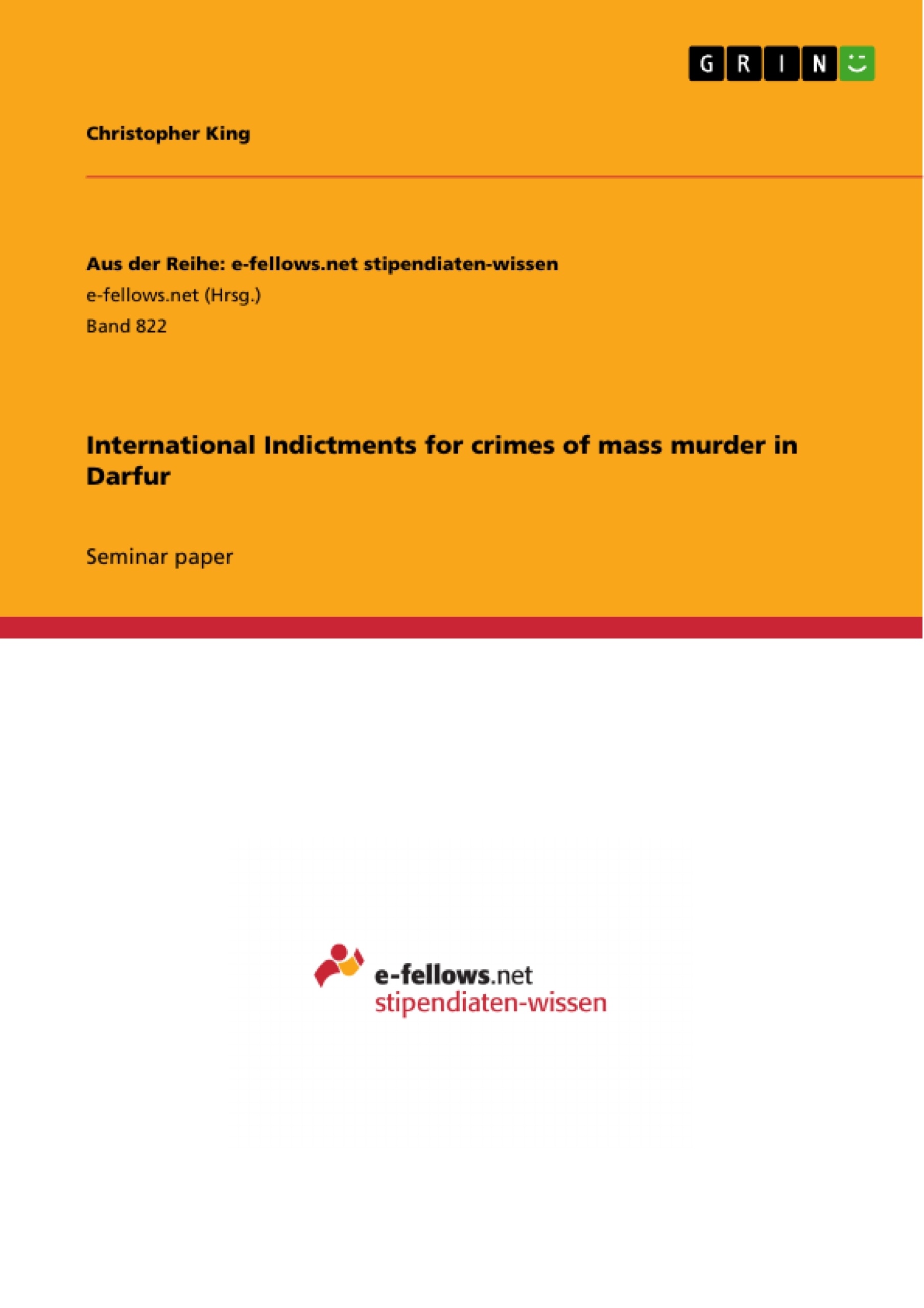“Until now, when powerful men committed crimes against humanity, they knew that so long as they remained powerful, no earthly court could judge them.” (Annan, Kofi, 07.28.1998)
These words of Kofi Annan, at that time secretary-general of the United Nations, were spoken shortly after the adoption of the Rome Statute of the International Criminal Court (ICC). They reflect the international effort to investigate and prosecute cruel crimes against humanity, war crimes, the crime of aggression and genocide. The intent of this paper is to present a stance on the question whether international indictments for crimes of mass murder in Darfur are appropriate and justified. It will be argued, that the international community has to punish perpetrators of mass violence under certain conditions, because of the following crucial points: (2.1) The international community has the moral and legal obligation to do so, (2.3) international justice should be pursued independently of regards to the peace process, (2.4) it may deter others and possibly produce domestic pressures and changes. Moreover, to be able to develop guidelines and policy recommendations the paper will also consider (2.2) the types of international punishment and who carries them out, as well as (2.5) examine the real capability of punishment and criteria of success. Before doing so, it is inevitable to (1.1) introduce the conflict, (1.2) the genocide debate and (1.3) the international response to the killings, because the stance on the use of international justice in Darfur is ultimately shaped by the interpretation of these issues.
Inhaltsverzeichnis (Table of Contents)
- Introduction
- The Conflict
- The Controversy over Genocide
- Overview of International Response
- Why International Justice in Darfur Is Justified and How it Should Be Pursued
- International Justice is Mandatory and a Moral Obligation
- Types of International Punishment and Who Should Carry it Out
- An Independent Judicial Proceeding
- Domestic and International Effects of the Indictments
- Capability of Punishment and Criteria for Success
- Conclusion
Zielsetzung und Themenschwerpunkte (Objectives and Key Themes)
This paper aims to argue whether international indictments for crimes of mass murder in Darfur are appropriate and justified. It will be argued that the international community has a moral and legal obligation to punish perpetrators of mass violence under certain conditions. The paper will further explore types of international punishment and how they should be carried out, as well as the capability of punishment and criteria for success. Here are some of the key themes that will be discussed in the paper:- The moral and legal obligations of the international community to address genocide.
- The role of international justice in conflict resolution and its potential impact on peace processes.
- The effectiveness of international indictments in deterring future violence and achieving accountability.
- The challenges and opportunities of pursuing international justice in ongoing conflicts.
- The importance of developing a comprehensive approach to international justice that combines legal, political, and humanitarian considerations.
Zusammenfassung der Kapitel (Chapter Summaries)
The paper begins by providing an overview of the complex conflict in Darfur, including its historical context, the role of the Sudanese government, and the devastating impact on the civilian population. It then delves into the debate surrounding the classification of the killings as genocide, highlighting the arguments for and against this designation. The paper concludes this section with a summary of the international response to the crisis, including the involvement of the International Criminal Court (ICC). The second chapter explores the justification for pursuing international justice in Darfur, emphasizing the moral and legal obligations of the international community to address genocide. The paper examines different types of international punishment and who should carry them out, emphasizing the role of the ICC and the principle of complementarity. It further discusses the potential benefits and drawbacks of pursuing international justice in an ongoing conflict, highlighting the importance of an independent judicial proceeding that is not subject to political manipulation. The third chapter focuses on the domestic and international effects of the indictments issued by the ICC. It examines the potential for deterring future violence, influencing domestic pressure, and creating a "blaming and shaming" effect on perpetrators. The chapter concludes by analyzing the capability of punishment and identifying criteria for a more successful implementation of international justice, emphasizing the need for domestic support, international recognition of crimes, and a hybrid approach that combines international and domestic judicial processes.Schlüsselwörter (Keywords)
This paper focuses on international justice, genocide, Darfur, Sudan, International Criminal Court (ICC), complementarity, peace process, impunity, deterrence, accountability, reconciliation, hybrid courts, UN Security Council.Frequently Asked Questions
Why is international justice justified in the Darfur conflict?
International justice is seen as a moral and legal obligation of the international community to punish perpetrators of mass violence and genocide, especially when domestic courts are unable or unwilling to act.
What is the role of the International Criminal Court (ICC) in Darfur?
The ICC is the primary body for investigating and prosecuting crimes against humanity and genocide in Darfur, following the principle of complementarity where it acts when national systems fail.
Can international indictments deter future violence?
Yes, indictments can serve as a deterrent by showing that "powerful men" are not immune to justice, potentially producing domestic pressure for change and creating a "blaming and shaming" effect on perpetrators.
Should justice be pursued even if it risks the peace process?
The paper argues that international justice should be pursued independently of political considerations regarding the peace process to ensure accountability and prevent future impunity.
What are the criteria for successful international justice implementation?
Success depends on domestic support, international recognition of the crimes, and often a hybrid approach that combines international expertise with domestic judicial processes.
- Citation du texte
- Christopher King (Auteur), 2012, International Indictments for crimes of mass murder in Darfur, Munich, GRIN Verlag, https://www.grin.com/document/262776



